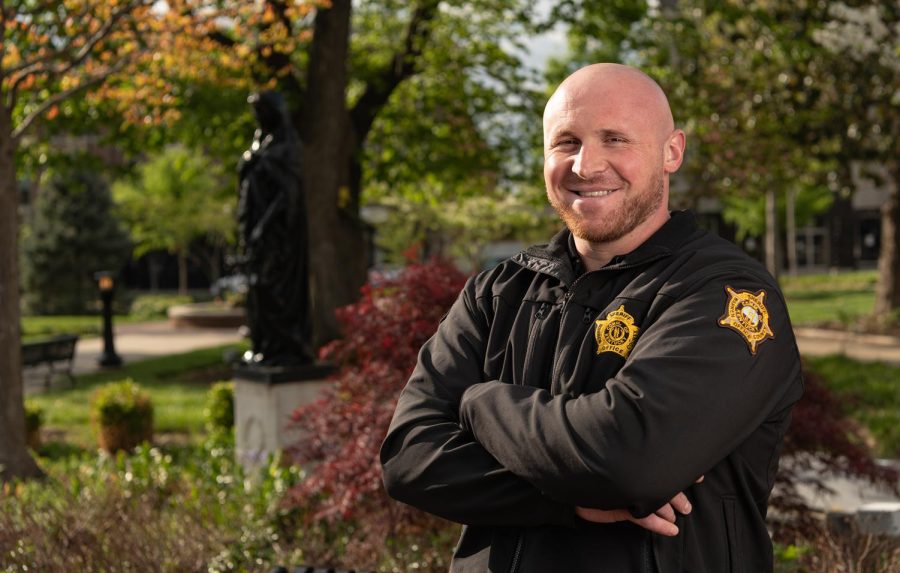‘Respect others, love yours’: Welcoming world religions
At the age of 13, when Vedad Hadzikadunic and his family immigrated to the United States from Bosnia in order to escape the atrocities of war, they first found a home in Houston, Texas. Soon after, they moved to Bowling Green, Kentucky.
For Muslim refugees, settling in a rural area in the Bible belt of America can present challenges; however, not only did Bowling Green embrace the refugee community, but Hadzikadunic found mentorship, support and lifetime friendship with the pastor of Hillvue Heights Baptist Church, Steve Ayres.
“You know, we’ve shared conversation and we respect each other’s position and we get along, and we want the best for each other,” Ayres said. “Vedad and I are a testimony that you listen and learn from each other instead of just to automatically draw a conclusion about each other.”
Ayres and Hadzikadunic put to rest any beliefs that differing religions cannot coexist closely together by seeing each other as human beings, not just representatives of their religions.
“It’s more about just, you know, just respect,” Hadzikadunic said. “Respect others, love yours.”
Ayres met Hadzikadunic as his defensive line coach at Warren Central High School. Ayres often gave rides to players after practice and eventually took Hadzikadunic to college visits.
Despite their differences, the two have been able to have educational conversations about life as well as religion. To this day, the pair stays in touch and encourages one another.
The pair is just a small piece of Bowling Green’s ability to bring often unlikely people together.
The growth of Bowling Green as a refugee and diverse community began in the 1980’s. Today, according to the 2020 census data, Warren County ranks as one of the most diverse counties in Kentucky and it only continues to grow.
Several churches in Bowling Green, such as Living Hope Baptist Church, have created outreach programs to help refugees start a life.
Benny Stofer, the local impact pastor at Living Hope, points to a passage in Acts in the Bible, as his guide to the role of the church in welcoming refugees to Bowling Green. He says that their job isn’t necessarily to convert people to Christianity, but to help them as human beings.
“[…] I feel a great responsibility to serve them that way,” Stofer said. “Just help them. I mean, all I am is a messenger, all we are messengers […] That’s the focus is to have compassion for people who really have made this tough journey.”
To serve the growing population of immigrants, Living Hope offers several different congregations in which different ethnic groups can worship in their native language. This, in addition to other outreach programs in the community, is an attempt to help refugees connect so that cultures have room to flourish.
Approximately 76% of adults in Kentucky are Christian with less than 1% being Muslim, according to Pew Research Center. In 2020, 0.6% of the population in Warren County practiced Islam, according to the Association of Religion Data Archives.
Imam Sedin Agic immigrated to the United States from Bosnia in 2007 after accepting the Imam position at the Bowling Green Islamic Center.
In the Islamic faith, the holy month of Ramadan honors the creation of the Quran, the holy book of Islam. During this month, strict fasting is observed from sunup to sun down. When the fast is broken outside of the restricted times, it is called Iftar.
Agic sees this as an opportunity to bring muslims of all nationalities together.
“We try to share some days like by communities if you want like to make your food; let’s say, Bosnians one day, let’s say Pakistani one day, Turkish people one day, the American people one day and Middle East one day,” Agic said, “Then you know, you’re trying everything. It’s fun. You’re together. We have a couple hundred people in one place.”
The Bowling Green mosque is no stranger to diversity and community. Since opening in 2005, the mosque hosts over 27 different nationalities. Similar to Living Hope, the Islamic Center also has services in different languages.
Much like Ayres and Stofer, Agic believes religion connects people of all backgrounds. He believes sharing cultures and experiences creates opportunities to grow as a community.
“God created us to be together,” Agic said. “It gives you relief and it’s good you’re not alone.”
Beyond community within different religious groups, sharing religion can help people have a stronger grasp on the world and creates appreciation.
“People have brought opportunity to Bowling Green through us having a diverse community so I think we’re richer for it,” Ayres said. “It’s challenged us all; it’s allowed us to be more global. It’s allowed us to have a deeper perspective of people all throughout the world.”
Sports editor Molly St. Clair can be reached at [email protected].

